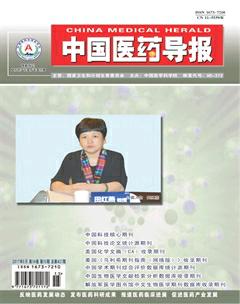程序性死亡分子—1及其配体在非小细胞肺癌中的治疗进展
王怡 杨泽 柏玉举
[摘要] 肺癌的传统治疗不尽人意,迫切需要探索新的治疗方法来打破这一瓶颈局面。免疫治疗是一种高特异性,低毒的新型治疗手段,其中阻断PD-1/PD-L1通路是最具有前景的治疗方向之一,目前大量研究报道PD-1和PD-L1抑制剂在晚期非小细胞肺癌治疗中取得显著疗效。然而PD-1/PD-L1抑制剂作为单药治疗或与其他抗肿瘤治疗联合在非小细胞肺癌中存在争议,本文将PD-1/PD-L1抑制剂在非小细胞肺癌中的治疗现状及最新进展进行综述。
[关键词] 程序性死亡分子-1;程序性死亡配体-1;免疫治疗;非小细胞肺癌
[中图分类号] R734.2 [文献标识码] A [文章编号] 1673-7210(2017)05(c)-0039-05
[Abstract] The traditional treatment of lung cancer is not satisfactory, so it is urgent to explore new therapy to break the bottleneck. Immunotherapy is a new treatment with low toxicity and high specificity. Suppressing the PD-1/PD-L1 pathway is considered as one of the most promising treatments. A number of studies reported that blockade of PD-1 and its ligand PD-L1 achieved favorable outcomes for advanced non-small cell lung cancer patients. Nonetheless, the anti-PD-1/PD-L1 antibody as monotherapy or in combination with other antineoplastic therapy in non-small cell lung cancer remains controversial. In this article, we reviewes the current state of research and advancement of PD-1/PD-L1 in the treatment of non-small cell lung cancer.
[Key words] PD-1; PD-L1; Immunotherapy; Non-small cell lung cancer
在全球,肺癌高发,且死亡率居于首位[1]。非小细胞肺癌(non-small cell lung cancer,NSCLC)占肺癌的80%~85%,大部分癌症患者确诊时已属晚期,丧失了手术及根治性放疗的机会,目前全身化疗是晚期NSCLC的主要治疗手段,但毒副作用大。对于基因敏感性突变的患者,可选择靶向治疗,但由于耐药问题,生存仍不理想,故探索新的治疗措施迫在眉睫。近年来,免疫治疗备受亲睐,其中程序性死亡分子-1(programmed death-1,PD-1)及其配体即程序性死亡配体-1(programmed death-ligand 1,PD-L1)已成为免疫治疗的新靶点,越来越多的研究报道PD-1/PD-L1抑制剂具有强大的抗肿瘤免疫反应,能够明显改善临床结局。但其作为单药或与其他抗肿瘤手段的联合治疗中仍然存在争议。因此,本文将PD-1/PD-L1抑制剂在NSCLC中的治疗现状及研究进展进行综述。
1 PD-1/PD-L1概述
PD-1是一種Ⅰ型跨膜蛋白,属于B7-CD28家族,它是一种免疫负调节因子,能抑制效应T细胞的活化,主要表达于T细胞、B细胞、单核细胞及树突状细胞表面,并与它们的分化和凋亡密切相关。目前已知有两个配体PD-L1和PD-L2,其中PD-L1为主要配体,在多种恶性肿瘤中高表达[2]。研究发现PD-L1与T细胞膜上的受体PD-1结合产生抑制信号,可阻止CD4+T细胞、CD8+T细胞增殖及细胞因子的产生,改变肿瘤微环境,使机体对肿瘤细胞的监视及清除能力减弱,产生免疫逃逸[3]。因此,阻断PD-1/PD-L1通路可以恢复免疫系统对肿瘤细胞的杀伤作用。近年来,PD-1/PD-L1抑制剂在肿瘤免疫治疗中已处于重要地位。目前主要的抗PD-1/PD-1抗体有nivolumab、Pembrolizumab、ipidilizumab、MPDL3280A及MEDl4736等。
2 PD-1/PD-L1表达与临床效应的关系
在精准医学时代,治疗获益最大化为主要目标,因此筛选有效的生物标志物尤为关键。有研究报道,60%NSCLC标本中PD-L1表达异常[4],然而其与预后的相关性尚不清楚,不同病理类型对PD-1/PD-L1抑制剂的反应是否存在差异也需进一步求证。在一项Ⅰ期研究中nivolumab作为一线单药治疗晚期NSCLC患者,PD-L1阳性组中ORR明显高于阴性组(31%和10%)[5],同样的,其他抗PD-1药物Pembrolizumab、atezolizumab的临床试验也得到了相似的结果[6-7]。由此看来,PD-L1似乎与药物疗效具有相关性。而另一项Ⅱ期研究却发现对于肺鳞癌患者PD-L1的表达对疗效并没有影响,24%的PD-L1阳性者以及超过14%的阴性者都能达到部分缓解[8]。CheckMate017也进一步表明PD-L1并非独立预后指标,不能决定患者的总生存期(overall survival,OS)及无进展生存期(progression-free survival,PFS)[9]。但CheckMate057[10]发现接受nivolumab治疗的肺腺癌患者中,PD-L1阳性者其疗效优于阴性者,因此该类药物的疗效可能与肺癌的病理类型相关,但具体机制尚不明确。虽然多个研究提示PD-L1阳性者在治疗中更具优势,但总的分析结果表明PD-L1的表达与药物疗效不具有显著的相关性,因此,PD-L1是否能作为疗效与预后的生物标志物还有待探索。
3 PD-1/PD-L1抑制剂单药治疗NSCLC
近年来一些Ⅰ~Ⅲ期临床试验显示了抗PD-1/PD-L1抗体单药治疗NSCLC具有良好临床效应。nivolumab是目前常用的抗PD-1单抗,最初用于治疗晚期黑色素瘤,而在肺癌治疗中的疗效也逐渐被认识。nivolumab在二、三线治疗中也表现出可喜的反应和良好的耐受性。CheckMate017显示nivolumab对比多西他赛二线治疗晚期肺鳞癌患者的OS、PFS及客观有效率(objective response rate,ORR)均有获益(OS:9.2和6.0个月,PFS:3.5和2.8个月,ORR:20%和9%)[11]。在CheckMate063也报道nivolumab治疗既往治疗失败的晚期肺鳞癌患者疗效显著,1年生存率为40.8%,ORR为14.5%,OS为8.2个月[12]。因此美国食品和药品管理局(FDA)于2015年3月批准了nivolumab用于一线化疗失败的晚期肺鳞癌患者,这给难治性晚期肺鳞癌患者带来了新的曙光。为了进一步探讨nivolumab在一线治疗中疗效和安全性,2016年10月欧洲临床肿瘤协会年会(ESMO)公布了CheckMate026的研究结果,nivolumab一线治疗晚期NSCLC在PFS方面并不优于传统化疗,原因可能在于纳入患者的PD-L1表达水平较低,因此在一线治疗中,PD-L1的检测及优势人群的选择尤为关键[13]。
Pembrolizumab是一种人源化的抗PD-1单抗。Keynote-001数据显示不同剂量和方案的Pembrolizumab(10 mg/kg,每2周或2 mg/kg,每3周)治疗晚期NSCLC,毒副作用无明显差别,且能耐受,总ORR为19.4%,OS为12.0个月,PD-L1的阳性分界值设定为50%,PD-L1阳性者ORR高达45.2%,PFS为6.3个月,而阴性者PFS仅为3.7个月[14]。这一结果表明Pembrolizumab单药治疗晚期NSCLC具有较强的反应及可耐受的毒副作用,将PD-L1>50%用来选择优势群体更能获益。并且这一结论在Keynote-024中得以验证[15],也首次证实Pembrolizumab一线治疗PD-L1高表达的晚期NSCLC在PFS和OS方面均优于传统化疗。目前美国FDA已批Pembrolizumab用于其他抗肿瘤治疗失败后且PD-L1表达阳性的晚期NSCLC治疗。
MPDL3280(atezolizumab)是一种新型的抗PD-L1单抗。POPLAR结果显示,atezolizumab较多西他赛作为二、三线治疗晚期NSCLC疗效更好,ORR为23%,OS高于多西他赛组(11.4和9.5个月)[16]。并且通过检测肿瘤细胞(TC)或肿瘤浸润免疫细胞(IC)上的PD-L1,发现在PD-L1低表达者中,atezolizumab组OS为未达到,化疗组OS为9.1个月,而在高表达者中atezolizumab组OS明显高于化疗组(OS:13.0和7.4个月)。最近BIRCH结果显示,atezolizumab一线或多线治疗PD-L1表达阳性的晚期NSCLC患者也取得了不错的疗效,ORR为27%,OS数据目前尚未完善[17]。
MEDI4736是另一种改良的抗PD-L1单抗。2014年美国临床肿瘤学会(ASCO)上报道MEDI4736在一线或多线治疗中也展现了出色的成绩[18],尽管纳入人数只有13例,但ORR达到23%,且未出现严重的毒副作用。目前一些关于MEDI4736单药或者联合用药的Ⅰ、Ⅱ期临床试验正在开展中。
4 PD-1/PD-L1抑制劑联合化疗治疗NSCLC
目前含铂类双药化疗是晚期NSCLC的标准治疗方案,但疗效并不理想。化疗可迅速缩小肿瘤,而免疫治疗的抗肿瘤效应缓和持久,在理论上,两者联合治疗更能有效地抑制肿瘤。Keynote-021证实了Pembrolizumab联合标准化疗对比单纯化疗一线治疗晚期NSCLC具有更好的疗效及可耐受毒副作用,联合组的ORR及PFS均高于化疗组(ORR:55%和29%,PFS:13和8.9个月),3级以上的毒副作用发生率较高(39%和26%),但毒副作用导致的停药率及治疗相关的死亡率在两组间相差不大(10%和13%,2%和3%)[19]。另一项Ⅰb期研究也报道了atezolizumab与化疗联合在一线治疗中具有优势[20]。虽然抗PD-1/PD-L1抗体联合化疗治疗晚期NSCLC展现了不错的成绩,但仍然存有争议,如药物的剂量、时间窗、疗效评价等。目前,一些ⅢA/B临床试验正在进行,我们将拭目以待。
5 PD-1/PD-L1抑制剂与靶向治疗联合治疗NSCLC
表皮生长因子受体酪氨酸激酶抑制剂(epidermal growth factor receptor tyrosine kinase inhibitor,EGFR-TKI)已成为EGFR阳性的晚期NSCLC的首选治疗。虽然能够显著延长PFS,但OS未能获益。免疫治疗与EGFR-TKI的联合可能是一种更具前景的治疗手段,Chen等[21]发现EGFR激活上调PD-L1可导致免疫逃避。也有证据表明,癌基因的遗传学改变与PD-L1相关。一项回顾性研究表明PD-L1与EGFR、KRAS突变具有相关性(P=0.001、0.006),值得注意的是,PD-L1阳性者较阴性者更能获益于TKI的治疗(P=0.01)[22]。另一方面,一项Ⅰ期剂量递增临床试验报道吉非替尼联合atezolizumab治疗NSCLC具有较好的耐受性[23],尽管尚未达到最大耐受剂量,但剂量限制性毒性(DLTs)并未发生,3~4级不良反应事件主要包括呼吸困难、缺氧、肌痛和疲劳,ALT升高,均可耐受。此外,有研究报道nivolumab联合厄洛替尼可使TKI继发性耐药的患者带来持续性的临床获益[24]。因此PD-1/PD-L1抑制剂与EGFR-TKI的联合应用可能成为新的治疗策略,PD-L1也可能作为有效的预测分子,这需要更多的临床试验求证。
關于其他靶向药物与PD-1/PD-L1抑制的联合治疗也有报道,Rizvi等[25]表明nivolumab联合贝伐珠单抗作为晚期NSCLC的维持治疗可使患者受益,联合组中位PFS为37.1周,中位OS没有达到(范围:33.3~86.7周),3~4级的毒副作用较少发生。耐昔妥珠单抗(necitumumab)是一种抑制EGFR的单克隆抗体靶向药物,necitumumab联合吉西他滨+顺铂一线治疗晚期肺鳞癌能显著提高患者生存,最近,一项关于necitumumab联合Pembrolizumab用于晚期肺鳞癌和非肺鳞癌患者的安全性和有效性的Ⅰ期试验正在开展[26]。
6 PD-1/PD-L1抑制剂联合放疗治疗NSCLC
放疗主要为通过DNA损伤导致肿瘤细胞死亡。通过辐射诱导形成复杂的免疫微环境从而增强宿主的免疫应答能力使转移灶消退,这种放射野外的肿瘤病灶缩小被称为远隔效应[27]。由于局部放疗能诱使机体产生广泛的抗肿瘤免疫效应,与免疫治疗产生协同作用,这使放疗联合免疫治疗成为可能。
CTLA-4是另一个免疫调节检查点,可抑制幼稚和记忆T细胞早期活化。已有研究报道放疗与CTLA-4抑制剂联合所产生的远隔效应能提高放疗效果[28]。Schaue等[29]证实了照射剂量能影响放疗的免疫调节效应。较高的放疗剂量能促进T细胞的集簇及肿瘤抗原的表达,因此大分割放疗更能激发免疫反应。目前,一些关于Pembrolizumab联合立体定向放疗(SBRT)治疗晚期NSCLC的Ⅰ、Ⅱ期研究正在开展中[30-31],试图探索放疗联合PD-1/PD-L1抑制剂在治疗NSCLC的新突破。
7 小结
近年来抗PD-1/PD-L1单克隆抗体在晚期NSCLC的治疗中崭露头角,成为免疫治疗领域的焦点。抗PD-1/PD-L1单抗作为第三、二,甚至一线治疗,无论是单药还是联合在NSCLC治疗中都取得了一定的成绩,但遗憾的是,并不是对所有的患者都有效,因此优势人群的选择尤为关键。在治疗中其毒副作用的发生率及特性也有待进一步研究。此外PD-1/PD-L1抑制剂在临床应用仍然存在很多局限和不足,如尚无PD-L1检测的“金标准”,PD-L1的表达可否能作为理想的分子标志物仍不清楚,如何选择这些药物的用药时机及停药时间点,如何选择有效的疗效评价体系以及如何进行疗效及预后的预测等等,这都需要更多的临床研究为晚期NSCLC的“精准”治疗提供依据。
[参考文献]
[1] Rebecca L,Kimberly D,Ahmedin J. Cancer statistics [J]. CA Cancer J Clin,2017,67:7-30.
[2] Topalian SL,Hodi FS,Brahmer JR,et al. Safety,activity,and immune correlates of anti PD-1 antibody in cancer [J]. N Engl J Med,2012,366(26):2443-2454.
[3] Ramsay AG. Immune checkpoint blockade immunotherapy to activate antitumour T-cell immunity [J]. Br J Haematol,2013,162(3):313-325.
[4] Taube JM. Unleashing the immune system:PD-1 and PD-Ls in the pre-treatment tumor microenvironment and correlation with response to PD-1/PD-L1 blockade [J]. Oncoimmunology,2014,3(11):e963413.
[5] Gettinger SN,Hellmann MD,Shepherd FA,et al. First-line mono-therapy with nivolumab(NIVO;anti-programmed death-1 [PD-1])in advanced non-small cell lung cancer(NSCLC):safety,efficacy and correlation of outcomes with PD-1 ligand(PD-L1)expression [J]. J Clin Oncol,2015,33(15 Suppl):8025.
[6] Garon EB,Rizvi NA,Hui R,et al. Pembrolizumab for the treatment of non-small-cell lung cancer [J]. N Engl J Med,2015,372(21):2018-2028.
[7] Herbst RS,Soria JC,Kowanetz M,et al. Predictive correlates of response to the anti-PD-L1 antibody MPDL3280A in cancer patients [J]. Nature,2014,515(7528):563-567.
[8] Rizvi NA,Mazieres J,Planchard D,et al. Activity and safety of nivolumab,an anti-PD-1 immune checkpoint inhibitor,for patients with advanced,refractory squamous non-small-cell lung cancer (CheckMate063):a phase 2,single-arm trial [J]. Lancet Oncol,2015,16(3):257-265.
[9] Spigel DR,Reckamp KL,Rizvi NA,et al. A phase Ⅲ study (CheckMate 017) of nivolumab (NIVO;anti-programmed death-1 [PD-1]) vs docetaxel (DOC) in previously treated advanced or metastatic squamous (SQ) cell non-small cell lung cancer (NSCLC) [J]. J Clin Oncol,2015,33:2015.
[10] Paz-Ares L,Horn L,Borghaei H,et al. Phase Ⅲ,randomized trial (CheckMate 057) of nivolumab (NIVO) versus docetaxel (DOC) in advanced non-squamous cell (non-SQ) non-small cell lung cancer (NSCLC) [J]. J Clin Oncol,2015,33(18 Suppl):LBA109.
[11] Brahmer J,Reckamp KL,Baas P,et al. Nivolumab versus docetaxel in advanced squamous-cell non-small-cell lung cancer [J]. N Engl J Med,2015,373(2):123-135.
[12] Rizvi NA,Mazieres J,Planchard D,et al. Activity and safety of nivolumab,an anti-PD-1 immune checkpoint inhibitor,for patients with advanced,refractory squamous non-small-cell lung cancer (CheckMate 063):a phase 2,single-arm trial [J]. Lancet Oncol,2015,16(3):257-265.
[13] Socinski M,Creelan B,Horn L,et al. CheckMate 026:a phase 3 trial of nivolumab vs investigator′s choice of platinum-based doublet chemotherapy as first-line therapy for stage Ⅳ/recurrent programmed death ligand 1 (PD-L1)-positive NSCLC[C]//. 2016 ESMO Congress,Abstract LBA7_PR. 2016.
[14] Garon EB,Rizvi NA,Hui R,et al. Pembrolizumab for the treatment of non-small-cell lung cancer [J]. N Engl J Med,2015,372(21):2018-2028.
[15] Reck M,Rodriguez-Abreu D,Robinson AG,et al. Pembrolizumab versus chemotherapy for PD-L1-positive non-small-cell lung cancer [J]. N Engl J Med,2016,375(19):1823-1833.
[16] Fehrenbacher L,Spira A,Ballinger M,et al. Atezolizumab versus docetaxel for patients with previously treated non-small-cell lung cancer(POPLAR):a multicentre,open-label,phase 2 randomised controlled trial [J]. Lancet,2016,387(10030):1837-1846.
[17] Rizvi NA,Chow LQM,Dirix LY,et al. Clinical trials of MPDL3280A (anti-PDL1) in patients (pts) with non-small cell lung cancer (NSCLC) [J]. J Clin Oncol,2014,32(15 Suppl):TPS8123.
[18] Brahmer J,Reckamp KL,Baas P,et al. Nivolumab versus docetaxel in advanced squamous-cell non-small-cell lung cancer [J]. N Engl J Med,2015,373(2):123-135.
[19] Langer CJ,Gadgeel SM,Borghaei H,et al. Carboplatin and pemetrexed with or without pembrolizumab for advanced,non-squamous non-small-cell lung cancer:a randomised,phase 2 cohort of the open-label KEYNOTE-021 study [J]. Lancet Oncol,2016,17(11):1497-1508.
[20] Liu SV,Powderly JD,Camidge DR,et al. Safety and efficacy of MPDL3280A (anti-PDL1) in combination with platinum-based doublet chemotherapy in patients with advanced non-small cell lung cancer (NSCLC)[J]. J Clin Oncol,2015,33(15 Suppl):8030.
[21] Chen N,Fang W,Zhan J,et al. Upregulation of PD-L1 by EGFR activation mediates the immune escape in EGFR-driven NSCLC:implication for optional immune targeted therapy for NSCLC patients with EGFR mutation [J]. J Thorac Oncol,2015,10(6):910-923.
[22] DIncecco A,Andreozzi M,Ludovini V,et al. PD-1 and PD-L1 expression in molecularly selected non-small-cell lung cancer patients [J]. Br J Cancer,2015,112(1):95-102.
[23] Creelan BC,Chow LQ,Kim D-W,et al. Safety and tolerability results from a phase I study of MEDI4736,a human IgG1 anti-programmed cell death-ligand-1 (PD-L1) antibody,combined with gefitinib in patients (pts) with non-small-cell lung cancer (NSCLC) [J]. J Clin Oncol,2015,33(15 Suppl):3047.
[24] Rizvi NA,Chow LQM,Borghaei H,et al. Safety and response with nivolumab (ant-i PD-1;BMS-936558,ONO-4538) plus erlotinib in patients (pts) with epidermal growth factor receptor mutant (EGFR MT) advanced NSCLC [J]. J Clin Oncol,2014,32(5 Suppl):8022.
[25] Rizvi NA,Antonia SJ,Shepherd FA,et al. Nivolumab (Anti-PD-1;BMS-936558,ONO-4538) maintenance as monot-herapy or in combination with bevacizumab (BEV) for non-small cell lung cancer (NSCLC) previously treated 2014, 90(5):S32.
[26] Eli Lilly and Company. A study of the combination of necitu-mumab (LY3012211) andpembrolizumab (MK3475) in participants with NSCLC. Available from:https://www.clinicaltrials.gov/ct2/show/NCT02451930. NLM identifier:NCT02451930. Accessed November 28,2015.
[27] Hatzi VI,Laskaratou DA,Mavragani IV,et al. Non-targeted radiation effects in vivo:a critical glance of the future in radiobiology [J]. Cancer Lett,2015,356(1):34-42.
[28] Golden EB,Demaria S,Schiff PB,et al. An absco-pal response to radiation and ipilimumab in a patient with metastatic non-small cell lung cancer [J]. Cancer Immunol Res,2013,1(6):365-372.
[29] Schaue D,Ratikan JA,Iwamoto KS,et al. Maximizing tumor immunity with fractionated radiation [J]. Int J Radiat Oncol Biol Phys,2012,83(4):1306-1310.
[30] Anderson Cancer Center. MK-3475 and hypofractionated stereotactic radiation therapy in patientswithnon-small cell lung cancer (NSCLC). Available from:https://www.clinicaltrials.gov/ct2/show/NCT02444741. NLM identifier:NCT02444741. 2015.
[31] Yale University. Evaluating the combination of MK-3475 and sterotactic body radiotherapy in patients with metastatic melanoma or NSCLC. Available from:https://www.clinicaltrials.gov/ct2/show/NCT02407171.NLM identifier:NCT024 07171. 2015.
(收稿日期:2017-01-14 本文編辑:李亚聪)

